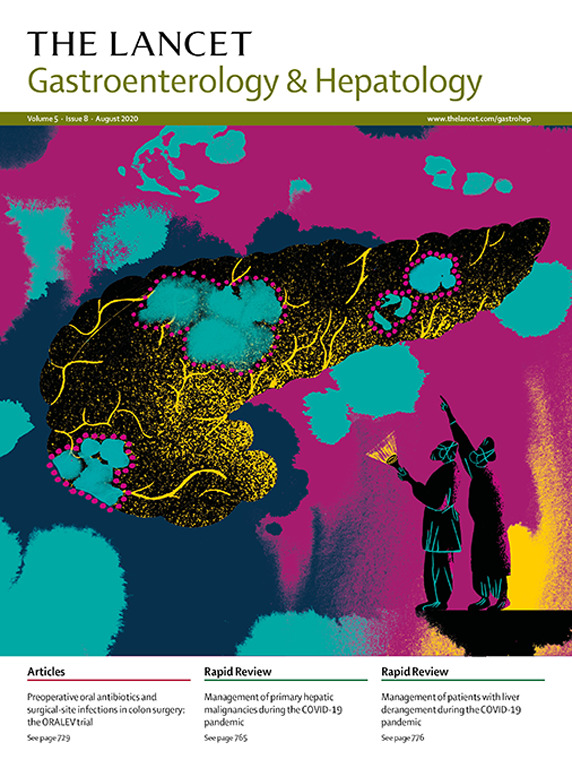Digestive Disease Week 2025
IF 38.6
1区 医学
Q1 GASTROENTEROLOGY & HEPATOLOGY
引用次数: 0
Abstract
Section snippets
AGMB-129 for fibrostenotic Crohn's disease
Interim results from the phase 2a, randomised STENOVA trial presented by Florian Rieder (Cleveland, OH, USA) show that AGMB-129—an oral, gastrointestinal-restricted, small molecule ALK5 (TGF-β receptor type-1) inhibitor—is safe in patients with fibrostenotic Crohn's disease. Adults with symptomatic fibrostenotic Crohn's disease and at least one confirmed ileal stricture were randomly assigned (1:1:1) to receive AGMB-129 200 mg twice per day, AGMB-129 100 mg once per day, or placebo for 12EBX-102-02 in IBS-C
EBX-102-02, an oral full-spectrum microbiome drug, was safe, well tolerated, and improved symptoms in patients with constipation-predominant irritable bowel syndrome (IBS-C), according to the randomised, double-blind, placebo-controlled, phase 2 TRIUMPH trial presented by Anthony Hobson (London, UK). 62 participants with Rome IV IBS-C (and IBS-SSS ≥175) were randomly assigned (2:1) to receive two doses (of eight capsules) of EBX-102-02 or placebo, 1 week apart. Between baseline and week 7, meanDupilumab for eosinophilic gastritis
In the randomised, double-blind, placebo-controlled, phase 2 DEGAS trial presented by Nirmala P Gonsalves (Chicago, IL, USA), dupilumab—a dual IL-4 and IL-13 blocker—was safe and efficacious in patients with eosinophilic gastritis. 41 adults and adolescents (aged 12–70 years) with symptomatic, histologically active eosinophilic gastritis (≥30 eosinophils per high-power field [hpf] in ≥5 hpfs in the gastric antrum, body, or both) were randomly assigned (1:1) to receive either placebo orLinaclotide in children with IBS-C
Already FDA-approved for adults, linaclotide showed safety and preliminary efficacy in children with IBS-C in a double-blind, phase 3 study presented by Jeffrey Hyams (Hartford, CT, USA). Children aged 7–17 years with Rome III IBS-C were randomly assigned to linaclotide 145 μg or 290 μg daily for 12 weeks. The primary endpoint, based on twice-daily eDiary entries, was the proportion of participants who had a reduction in abdominal pain of at least 30% and an increase of at least two spontaneous消化疾病周2025
agmb -129用于纤维狭窄性克罗恩病Florian Rieder (Cleveland, OH, USA)提交的2a期随机STENOVA试验的中期结果显示,agmb -129——一种口服、胃肠道受限的小分子ALK5 (TGF-β受体1型)抑制剂——对纤维狭窄性克罗恩病患者是安全的。根据随机、双盲、安慰剂对照的研究,有症状性纤维狭窄性克罗恩病和至少一个确认的回肠狭窄的成年人被随机分配(1:1:1),接受AGMB-129 200毫克每天2次,AGMB-129 100毫克每天1次,或12EBX-102-02在IBS-CEBX-102-02中的安慰剂,这是一种口服全谱微生物组药物,安全、耐受性良好,并改善便秘为主的肠易激综合征(IBS-C)患者的症状。Anthony Hobson(英国伦敦)提出的2期TRIUMPH试验。62名罗马IV型IBS-C(和IBS-SSS≥175)患者被随机分配(2:1)接受两剂(8粒胶囊)EBX-102-02或安慰剂,间隔1周。在Nirmala P Gonsalves (Chicago, IL, USA)提出的随机、双盲、安慰剂对照的2期DEGAS试验中,dupilumab (IL-4和IL-13双重阻断剂)对嗜酸性胃炎患者是安全有效的。41名有症状的、组织学上活跃的嗜酸性粒细胞性胃炎的成人和青少年(12-70岁)(胃窦、身体或两者中每高倍场(hpf)≥30个嗜酸性粒细胞≥5个hpfs)被随机分配(1:1)接受安慰剂或利那洛肽治疗IBS-C儿童。利那洛肽已被fda批准用于成人,在Jeffrey Hyams (Hartford, CT, USA)提交的一项双盲3期研究中,利那洛肽显示出对IBS-C儿童的安全性和初步疗效。7-17岁患有罗马III型IBS-C的儿童被随机分配到每天145 μg或290 μg的利那克洛肽,持续12周。主要终点,基于每日两次的日记记录,是腹痛减少至少30%和自发性增加至少两次的参与者的比例
本文章由计算机程序翻译,如有差异,请以英文原文为准。
求助全文
约1分钟内获得全文
求助全文
来源期刊

Lancet Gastroenterology & Hepatology
Medicine-Hepatology
CiteScore
50.30
自引率
1.10%
发文量
0
期刊介绍:
The Lancet Gastroenterology & Hepatology is an authoritative forum for key opinion leaders across medicine, government, and health systems to influence clinical practice, explore global policy, and inform constructive, positive change worldwide.
The Lancet Gastroenterology & Hepatology publishes papers that reflect the rich variety of ongoing clinical research in these fields, especially in the areas of inflammatory bowel diseases, NAFLD and NASH, functional gastrointestinal disorders, digestive cancers, and viral hepatitis.
 求助内容:
求助内容: 应助结果提醒方式:
应助结果提醒方式:


